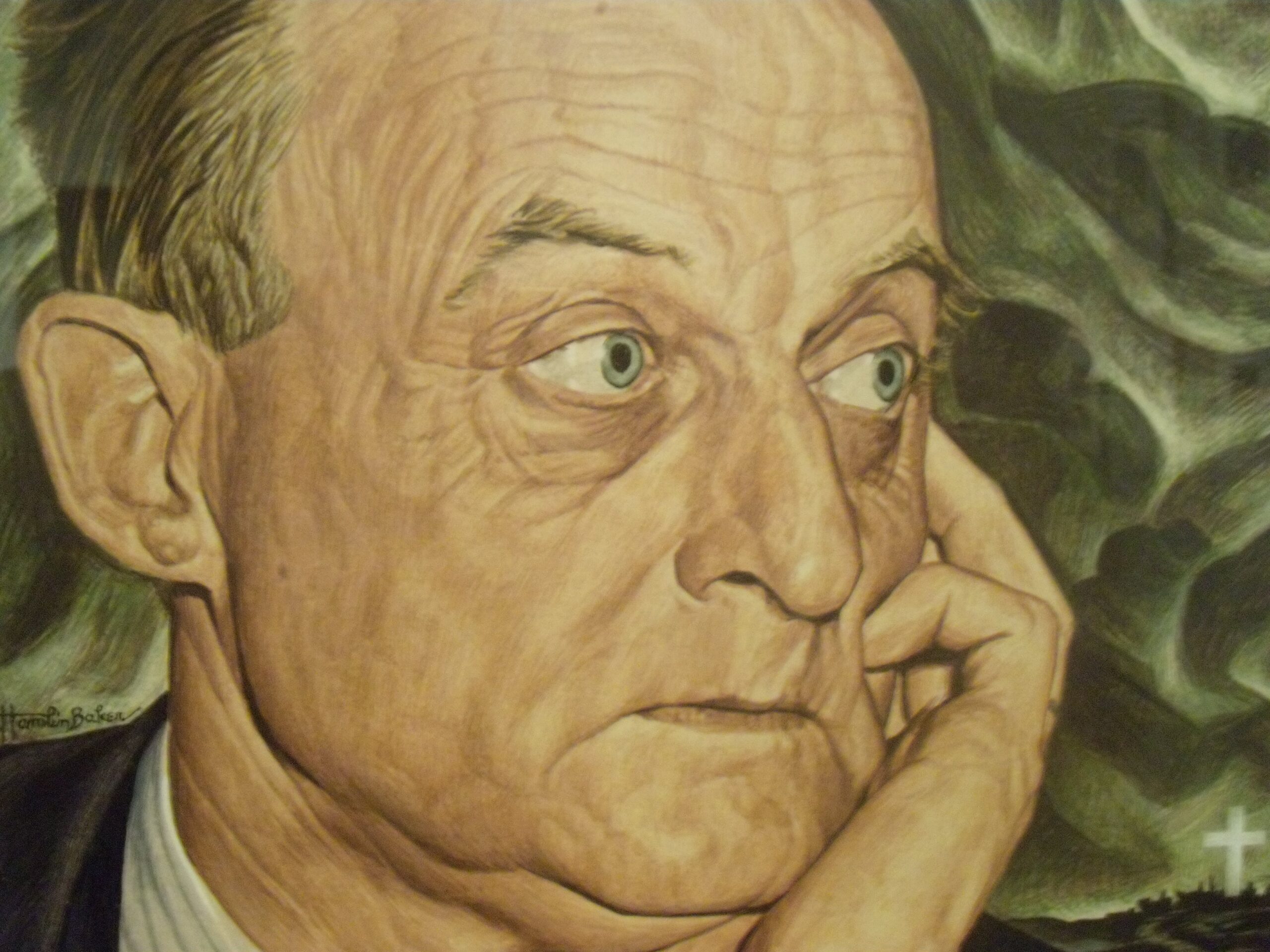This review appears in the Fall 2020 issue of Modern Age. To subscribe, click here.
America’s Revolutionary Mind:
A Moral History of the Founding and the Declaration That Defined It
By C. Bradley Thompson
(Encounter Books, 2019)
America on Trial: A Defense of the Founding
By Robert R. Reilly
(Ignatius Press, 2020)
Bradley Thompson and Robert R. Reilly have written two outstanding and erudite books that defend the American Founding. Both argue that the Declaration of Independence states universally true principles of individual rights and government, and both look to the history of ideas for the origins of these principles. But if “ideas have consequences,” these writers discern mostly different ideas that lead to similar consequences.
The principal reason for this difference lies in the intellectual backgrounds of the two authors. Thompson is an Objectivist, that is to say, a follower of Ayn Rand. Reilly is a Roman Catholic, whose thought is influenced by Thomas Aquinas, though not totally determined by it.
For Thompson, the self-evident truths of the Declaration reflect the thought of one philosopher: John Locke. According to Thompson: “America’s revolutionary mind is virtually synonymous with John Locke’s mind. The moral modes of reasoning used in Locke’s Essay and the political principles contained in his Second Treatise profoundly shaped the world-view of eighteenth-century Americans.”
What in Locke’s thought differed from earlier thinkers’ principles and enabled him to have such remarkable influence? It is in Thompson’s answer to this question that the influence of Objectivism becomes apparent. For Objectivists, religion is mysticism. On this view, the Enlightenment freed us from the thrall of unreason, and the scientific method that replaced the arid scholasticism of the Middle Ages brought with it gains in knowledge unparalleled in history. Thompson says of the Enlightenment, “One thing was certain during the Enlightenment: faith, revelation, mystic insight, and a priori speculation were rejected.” Francis Bacon, a key figure in the development of the Enlightenment’s method of scientific investigation, “rejected the Scholastics’ syllogistic reasoning that began from abstract, a priori first principles and then deduced conclusions that bore little relationship to concrete reality. . . . Bacon’s method proceeded by examining experience, collecting and organizing data, experimenting on nature’s operations, inducing causes from effects, and then discerning patterns and law-like principles.” Locke believed that individual rights could also be defended by examining experience rather than having to rest on a theological foundation.
For Thompson, Locke’s great merit was to apply this new mode of thought to moral and political affairs. Locke and the Scottish philosopher Thomas Reid, also widely studied by the American revolutionary generation, agreed with Bacon. So far, you might object, this view is not unique to followers of Ayn Rand. Why then do I claim that Thompson’s Objectivism controls his presentation? The answer lies in what he says about Locke’s justification for rights.
Thompson argues that “self-ownership is the fundamental right for Locke. It is a right that excludes and overrides all other claims against a man. From the moral right of self-ownership, other rights follow deductively, which he [Locke] sums up as ‘that equal right that every man hath to his natural freedom.’ Self-ownership and the requirements of human life mean that it is right—indeed, necessary—that men have freedom in order to pursue the values necessary for them to live well” (emphasis in original). In other words, to survive as a rational being you need the right of self-ownership and the right to acquire property. Further, your choice to survive is the condition of value. All this is straight from Rand.
To point out its similarity with Rand hardly suffices to show that it is incorrect to attribute this position to Locke. That is indeed so, but Thompson puts to one side Locke’s professed Christian beliefs. For example, when he considers what Locke has to say about rewards and punishments for obeying or rejecting the laws of nature, he considers only secular consequences. Locke, though, does not thus limit his account. He argues that because atheists do not believe that God rewards and punishes people after they die, they lack motivation to obey the moral law.
Thompson might respond that he, along with both Straussian and Marxist interpreters, thinks that Locke’s Christianity amounts to very little. But is it plausible to say this about the American revolutionaries also? Thompson does not lack the courage of his convictions. Regardless of their appeals to the Bible, the revolutionaries, Thompson contends, arrived at their moral beliefs about rights through purely secular reasoning. According to Thompson: “Most revolutionaries assumed that God was the ultimate source of man’s rights just as he was the source of nature’s laws. Jefferson’s ‘Creator’ is the source of man’s rights, but his ‘Creator’ is also ‘Nature’s God,’ and ‘Nature’s God’ is virtually synonymous for Jefferson with nature pure and simple.”
It’s not only Jefferson, though. Based on extensive research, Thompson thinks he can show that the actions of the revolutionaries, from their initial protests in the 1760s to their decision in 1776 to seek independence from Britain, followed logically from their philosophical commitments. “The American mind was forged in the 1760s and 1770s under the pressure of events provoked by the imperial crisis and as a result of the provincials’ confrontation with certain philosophical ideas,” Thompson concludes. “It was a revolution that advanced new moral values and virtues, new manners and mores, and a new way to think about moral character and moral action. From this fundamental change in the Americans’ moral values followed all of the subsequent social, political, and economic changes that would come to define a new way of life in America.”
Thompson’s case is far stronger than I had thought possible, and he has written what he calls “moral history” as well as it can be done. But I doubt that history can be deduced by following a philosophical formula. What an idea means in concrete historical circumstances often depends on the customs and institutions of the time. Thompson recognizes this himself when he depicts the hierarchical character of eighteenth-century American society, showing that belief in Lockean rights was often compatible with what most people today would consider very unequal treatment. Further, peoples’ interests often, though not always, affect how they apply their ideas. Thompson gives a good account of Jefferson’s failure to free his own slaves, despite his belief that “all men are created equal.” Yet he fails to appreciate the relevance of this counterexample to his brand of history by syllogism.
Equality and Nature’s God
When we turn to America on Trial, we encounter a curious inversion. Thompson stressed that the American revolutionaries favored individual autonomy, and the system of government established under the Constitution was based on that value. In his view, that is a very good thing.
Reilly, by contrast, wishes to answer Catholic critics of the American Founding, such as Patrick Deneen and Michael Hanby, who think that individualism is exactly what is wrong with the American regime. In this perspective, Thompson is correct that the right to unlimited acquisition is central to the Founding, but so much the worse for America.
Reilly answers that America was founded not on unlimited individualism but rather on a Christian realist metaphysics. He asserts that “reconsideration of the basic insights of Plato, Aristotle, and Cicero in light of Judeo-Christian revelation was the base secured for the development of democratic constitutional order. The Founding principle ‘that all men are created equal’ arose, and could have arisen only, in a culture thoroughly saturated with the teaching of the Imago Dei.” For Reilly, “Nature’s God” is found not only in experience. It is also the Judeo-Christian God described in the Bible.
A realist metaphysics, such as that found in classical Thomism, holds that there are fixed essences in nature. If there are no such essences, philosophy can offer no barrier to the arbitrary will of the sovereign, and individual rights have no basis. To defend a proper doctrine of essences, we must reject a competing position, that of theological voluntarism. Reilly says that the nominalism of William of Ockham “flips the relationship between intellect and will. God’s will becomes primary, and his intellect subordinate to it as a mere instrument. It is no longer his knowledge that constitutes being; it is his will that does so.” Reilly is a scholar of great learning, but it is surprising that he nowhere cites Richard Weaver’s Ideas Have Consequences, which argues in a similar way about the implications of Ockham’s nominalism.
Nominalism has disastrous consequences for individual rights. Reilly argues that without essences in nature, natural law lacks any basis. If so, nothing blocks the arbitrary will of the sovereign. What he says is law, so long as he can back up his commands by force. Constitutional government and individual rights cannot limit him.
Reilly shows very effectively that thinkers besides Locke, whose empiricist views are dubious from the standpoint of Thomist realism, opposed the unlimited power of the sovereign. Jefferson and the other Founders read and were influenced by such Catholic stalwarts as Bellarmine and Suarez, as well as the great Anglican divine Richard Hooker. The Founders appealed to these thinkers to defend their own principles of individual rights. Reilly has rendered an immensely valuable service in bringing this material to our attention. He shows that contrary to Deneen, the Founders did not overthrow virtue the better to support unlimited acquisition.
Reilly does not show, though, that metaphysical realism logically implies a specific political position. Aquinas allowed slavery under certain conditions. Yet Reilly’s interpretation of American principles forbids it, even if those principles were inconsistently applied.
Neither has Reilly shown that nominalism implies political absolutism. Certainly, as he indicates, Hobbes was both a nominalist and an absolutist. But this does not demonstrate that the first view implies the second. William of Ockham, Reilly’s nominalist intellectual villain, accepted a version of natural law. For him, law depends on God’s will, but one way we discover God’s law is by thinking about human nature. Like Thompson, though with a very different basis, Reilly thus endeavors to deduce history from a philosophical formula. It is not simply that ideas have consequences. They seem to be the only thing that matters.
I shall not say that this cannot be done, but such a deduction is antecedently unlikely. Both these authors have much to teach us, but their lessons are not altogether what they think they are. The logic of ideas, while not to be dismissed, does not work itself out as an external presence that inevitably leads to specific outcomes. As an example, both Thompson and Reilly, here following Harry Jaffa, stress Lincoln’s insistence that the equality clause of the Declaration of Independence applied fully to slaves. (Both are in varying degrees Jaffaites.) But they ignore Lincoln’s willingness in 1861 to guarantee slavery in the states where it existed, in order to avert secession. Ideas are indeed important, but as the nineteenth-century “relativists” and “historicists” Thompson and Reilly both condemn have taught us, nothing can replace the historian’s grasp of particular circumstance.
David Gordon is a senior fellow of the Ludwig von Mises Institute and editor of The Journal of Libertarian Studies.













